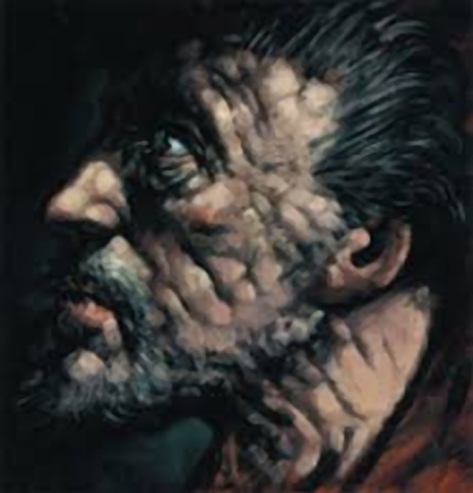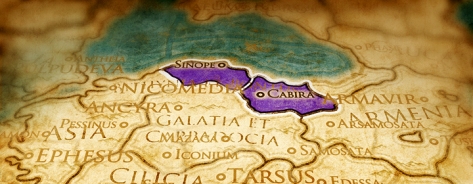Persecution caused the followers of Asura to hide their temples with cunning art, and to veil their rituals in obscurity; and this secrecy, in turn, evoked more monstrous suspicions and tales of evil.Part One: Seas Red and Black
But Conan’s was the broad tolerance of the barbarian, and he had refused to persecute the followers of Asura or to allow the people to do so on no better evidence than was presented against them, rumors and accusations that could not be proven. "If they are black magicians," he had said, "how will they suffer you to harry them? If they are not, there is no evil in them. Crom’s devils! Let men worship what gods they will."
- "The Hour of the Dragon," The Bloody Crown of Conan, p151-152
Part Two: Riders Beyond the Silk Road
Part Three: In The Country of the Man-Eaters
Part Four: The Cross on the Ice
Part Five: The Outermost Ends of the Earth
Part Six: A Cave in the Realm of the Wolf-People
Part Seven: "This Day A Martyr Or A Conqueror!"
The last tour of Saint Andrew would be through civilised lands - and, as tends to be so typical throughout life, it's often the civilised peoples who are the least tolerant of those who are different.
Andrew returned to familiar ground: to the Greek colonies of Chersonesos in the Cimmerian Bosporus, and Sinope in Pontos. As mentioned before, there were existing Christian communities in those locations, so Andrew was likely meeting old friends. From there, he embarked on a whistle-stop tour through Roman Greece.
First, he made his way to Macedonia, once the seat of Alexander's empire - now just another Roman province, like so many other once proud independent nations. Macedonia put up a hard fight, with no less than four wars before the fall of the kingdom. There is also a possibility he travelled to Epirus, in the south of what is now Albania: Andrew is mentioned as preaching in Epirus in ancient texts, but there are no Epirote traditions - or, at least, none survive. There could be any number of reasons for this beyond Andrew failing to make much of an impact: the fallout of the Byzantine Iconoclasm, the split of the Roman Empire into East and West, or the devastation of barbarian invasion by Ostrogoths, Visigoth, and Huns, could have left any Andrew traditions lost to history. Epirus is famous for its most famous son, Phyrrus - from whom the term Phyrric Victory derives - and his elephants.
Whether he went to Epirus or not, he eventually made his way to Thessaly, that old battleground between warring city states and the Persian invasion. He continued south to the city of Lamia, may have visited Galaxidi, Loutraki, and Corinth, before heading west to his final destination - the city of Patras. It was there he met his end.
Traditionally there's been some controversy about the death of Andrew: some place it during the reign of Nero (54-68 AD), others Domitian (81-96), and still more Trajan (98-117 AD). The most commonly cited date I've seen is 70 AD, which is just a year after the Year of the Four Emperors. George Alexandrou suggests Trajan's reign is more likely, which would place it almost thirty years later.
On this day, St. Andrew the Apostle, the brother of St. Peter, was martyred. He was chosen to go to the city of Lydd and to Kurdistan. He entered the city of Lydd, where most of its people had believed at the hands of St. Peter. He was accompanied by his disciple, Philemon, who had a sweet voice and was a good reader. St. Andrew commanded Philemon to go up to the pulpit and read.
When the priests of the idols heard of the arrival of Andrew the Apostle, they took their spears and went to the church. They stood outside the church to hear if he was cursing their gods or not. They heard Philemon reading the words of David the Prophet, "Their idols are silver and gold, the work of men's hands. They have mouths, but they do not speak: eyes they have but they do not see: They have ears, but they do not hear: noses they have, but they do not smell: They have hands, but they do not handle: feet they have, but they do not walk: nor do they mutter through their throat. Those who make them are like them; so is everyone who trusts in them." (Psalm 115:4-8)
Their hearts rejoiced because of his sweet voice and their emotions mellowed. They entered the church, and bowed down at the feet of Andrew the Apostle. He preached to them and they believed in the Lord Christ. Then he baptized them with the rest of those who worshipped idols. Andrew the Apostle, then left them and went to Kurdistan and to the cities of Aksis, Aregnas and Henefores, to preach there.
He also went with St. Bartholomew to the city of Azrinos. Its people were wicked and knew not God. They went on preaching and teaching them until they lead many of them to the knowledge of God, because of the signs and wonders they performed before them. Those who did not believe plotted against him. They sent for him so that when he arrived, they would attack him and kill him. When their messengers came to St. Andrew and heard his sincere teachings and saw his shining face, they believed in our Lord Christ and did not return to those who had sent them. The unbelievers decided to go to him and burn him. When they gathered around him to do what they had intended, the Apostle prayed to the Lord, and immediately fire came down from heaven and surrounded them. They were terrified and believed.
The report of St. Andrew the Apostle, was heard throughout all these countries and many believed in the Lord. Nevertheless the priests of the idols did not cease looking for him in order to kill him. Afterwards, they gathered and went to him; they bound him and beat him severely. After they dragged him around the city naked, they cast him into prison, so that they might crucify him the following day. Their custom was to stone those who were to be killed by crucifixion. The Apostle spent his night praying to God. The Lord Christ appeared to him and strengthened him saying, "Do not fear or worry for the time of your departure from this world is near." He gave him peace and disappeared. St. Andrew's soul rejoiced for what he saw.
On the next day, they hanged him upon a tree and stoned him until he departed. Certain believers came and took his holy body and laid it with great honor in a private grave. Many signs and wonders were made manifest from his body.
His prayers be with us and Glory be to our God forever. Amen.
- "The Martyrdom of St. Andrew the Apostle, the Brother of St. Peter," Coptic Orthodox Church, Commemorations for Khiak 4
Andrew travelled, preached, and lived among some of the most feared tribes of the Ancient world. He survived the wild warrior-women of Scythia and the barbarians beyond the borders of civilisation; he escaped the country of the Androphagoi and Cynocephalae; he emerged from the burning desert of the Ethiopians and the freezing rivers of Thule; he counted the Dacians, Thracians, Galatians and Sarmatians among his Christian brethren... only to die at the hands of the "civilised" world.
Part Nine: The Scotland Yet To Come



No comments:
Post a Comment